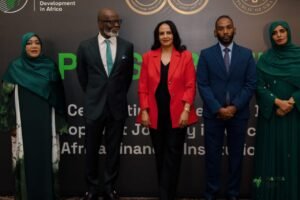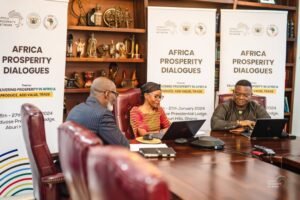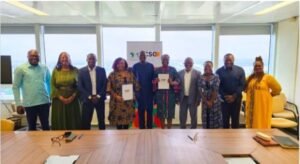
President Akufo-Addo welcomes a Malian military leader to the Peduase Lodge
President Nana Addo Dankwa Akufo-Addo, Chairman of ECOWAS, says there is the need to bring finality to the political upheaval in Mali.
Speaking to journalists after over eight hours of deliberations with other ECOWAS leaders at Peduase Lodge, yesterday, to resolve the political stalemate in Mali, the President said the Mali situation calls for a quick resolution.
He said there is the need to have a government in place to bring things to normal in Mali, adding: “And that is the reason why I decided that it will be a good thing for us to meet face to face with the military leaders in Mali so we could talk eye ball to ball.”

Position of ECOWAS
President Akufo-Addo disclosed that the meeting was able to reaffirm the position of ECOWAS, adding that there is the need to have a civilian leadership in Mali.
“We have also made it clear that the minute leadership is put in place through the processes that they themselves have agreed on in Mali. The sanctions that have been placed against Mali will be lifted by ECOWAS,” he assured
He added that the decision is now in the hands of the Malians, revealing that in a week’s time the mediator would be back to Bamako to see the state of affairs in the political troubled country.

President Akufo-Addo said the issues that have been put out should be dealt with in matter of days, and not weeks.
The meeting was attended by at least eight Presidents, Mali’s political junta and other stakeholders.
Guinea’s Alpha Conde, Togo’ s Faure Gnassingbe, Nigerien leader Mahamadou Issoufou, who is the immediate past ECOWAS Chair, Senegalese President Macky Sall, Burkinabe Head of State Roch Marc Christian Kabore, Cote d’Ivoire President Alassane Ouattara and the Nigerian Vice-President Yemi Osinbajo were part of the consultative meeting.

Mali
Mali, a country of 20 million people, has been unstable politically since 2012 when soldiers opposed to the response by the government to the separatist insurgency by Tuareg rebels in the country’s north staged a coup d’etat.
Since then, the political unrest in the country has served as a magnet for al-Qaeda and ISIL-linked groups, who have launched attacks on other West African nations from there, drawing concerns from the 15-member regional bloc.
The recent unrest in the country follows the worsening security situation created by extremist Islamic groups who have leveraged the Tuareg insurgency and local militia that have banded to quell the chaos.

Mali’s leader, Ibrahim Boubacar Keita, whose re-election in 2018 was marred by low turnout and allegations of fraud, further ignited deep resentment for his government.
He has also been accused of mismanaging the economy and the ongoing insurgency in the north, coupled with allegations of corruption.
Since June 2020, numerous protests had been staged for Keita’s resignation, leading to elements of the Malian Armed Forces staging a coup on August 18, 2020, forcing the 75-year-old leader to resign and dissolve his government, with the Junta promising new elections within a reasonable timeline.

The situation was strongly condemned by the international community, including the United Nations, the African Union as well as ECOWAS, who urged the soldier to return to the barracks, release, immediately, Keita, who had been held since his deposition.
ECOWAS further imposed sanctions on Mali, and asked neighbouring states to close their land and air borders with the country.
It also gave the military Junta a deadline of September 15 to appoint a new civilian President and Prime Minister.

The Peduase meeting, the first official assignment of President Akufo-Addo, after assuming the position as Chairman of ECOWAS, was expected to consolidate all the mediation efforts by the bloc to return Mali to constitutional rule and prevent further deterioration of the political situation there.
Source: dailystatesman.com.gh







